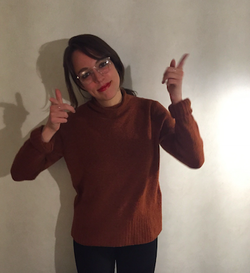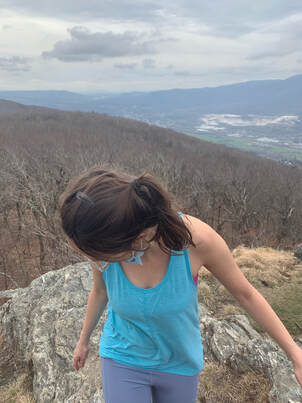
Hi, I'm Becca. I am the non-fiction book critic of the Washington Post, an editor at The Point, and a contributing editor at The Boston Review . My essay collection, All Things Are Too Small, was published Metropolitan Books in the US and Virago in the UK in April 2024. The New York Times called it "splendidly immodest" and "exhilarating" and The Guardian called it "bracing and brilliant." It was a New York Times editors' pick and a New Yorker weekly recommendation. Finally, I am also a PhD candidate (on indefinite hiatus) in philosophy at Harvard, but i remain perhaps delusionally convinced that someday I will finish my dissertation. These days I live in Washington, DC, with this person, whom I love. Here you can find all of my Washington Post pieces, which will come out each week, generally speaking.
To keep up with my writing/rantings, subscribe to my substack here. As a writer: I have contributed essays, book reviews, and the occasional art review to publications like The TLS, The Nation, The New York Times Book Review, The New Yorker, The Atlantic, Liberties, Bookforum, Art in America, The Yale Review, The Baffler, and more. These days, I write mostly for the Washington Post about non-fiction, but occasionally I write essays on fiction and whatever else for other venues. I am the winner of the first annual Robert B. Silvers Prize for Literary Criticism (see more here) and the 2023 Nona Balakian Citation for Excellence in Reviewing (see more here). In 2017, I was a finalist for a National Magazine Award in the essays/criticism category. A few authors I especially love are Joseph Roth, Italo Svevo, Henry James, Henry Green, Heinrich von Kleist, Marie de France, and Norman Rush. My agent is Anna Sproul-Latimer of Neon Literary. As a (lapsed?) philosopher: I am primarily interested in aesthetics (especially aesthetic value and its relationship to other types of value), the philosophy of love and sex, and the history of German philosophy, especially Martin Heidegger, although I have increasingly consuming secondary interests in political philosophy. In "The Good, the Bad, and the Ugly," published in The British Journal of Aesthetics, I defend aestheticism, the view that aesthetic value is sometimes a partial grounds of moral value. I describe aestheticism in more detail in a chapter in the Oxford Handbook of Ethics and Art. If I ever get around to completing it, my dissertation will be about some combination of the following: what it is to be a beautiful person, why evolutionary psychologists are wrong about human beauty, the ethics of exclusionary romantic/sexual/aesthetic preferences, and what role the state should play in ameliorating inequitable distributions of intimate "goods." I hold a first-class MPhil in the history and philosophy of science from the University of Cambridge and a B.A., summa cum laude with high honors, from Dartmouth College, where I studied philosophy & German (and cultivated an enduring distaste for fraternities). I receive many emails asking for advice about graduate school applications. I have answered some frequently asked questions on this page. As I note there, I do not consider myself an expert in how to write a successful graduate school application, and I urge all prospective grad students to consult resources online, as well as supervisors who have served on admissions committees, rather than me! Before the pandemic, I followed Hegel in regarding nature as geistlos, but now, like any good Heideggerian, I am a big fan of hiking. Here I am in the Berkshires, which I love
|
|
I suspect that most people would rather live in a work of fiction than in reality, but the narrator of Ben Lerner’s 2014 novel, 10:04, fails to appreciate his good fortune. He is lucky enough to find himself in a book by one of the supplest stylists in America, but often, he seems intent on clambering out of art and into life. Not only does he bear such an uncanny resemblance to his non-fictional creator that the two threaten to bleed together, but, on a series of visits to his moribund mentor, he reflects that if he were the one on his deathbed, ‘I wouldn’t even think about literature, would just be asking for morphine and distracting myself, if possible, with reality TV.’
This scene could not contrast more starkly with a strikingly similar sequence in Pure Colour, Sheila Heti’s latest genre-defying effusion. The book’s protagonist, Mira, is tasked with tending to her father in his final weeks, but her loss does not convince her of the frivolity of aesthetics. Instead, ‘it seemed to her the week her father was dying that nothing mattered but art and literature’. Heti’s, whose own father died when she first set to work on the book, is no stranger to the sharp bite of grief, but she is nonetheless unequivocal about beauty’s primacy. Mira’s stifling depression lifts only when she marvels at the Christmas lights in her neighbourhood and becomes ‘choked up with gratitude over all those tiny shining souls that adorned the trees and the falling-down porches’. Read more here.
1 Comment
10/26/2023 12:16:53 am
Living in a work of fiction does sound tempting, doesn't it? But the contrast between the narrators in Ben Lerner's "10:04" and Sheila Heti's "Pure Colour" is truly fascinating. It's a reminder that art and literature can hold immense significance in our lives, even in the face of loss. Here's to finding beauty in the smallest moments this Christmas season. 📚✨🎄
Reply
Leave a Reply. |
Archives
June 2022
Categories |

 RSS Feed
RSS Feed